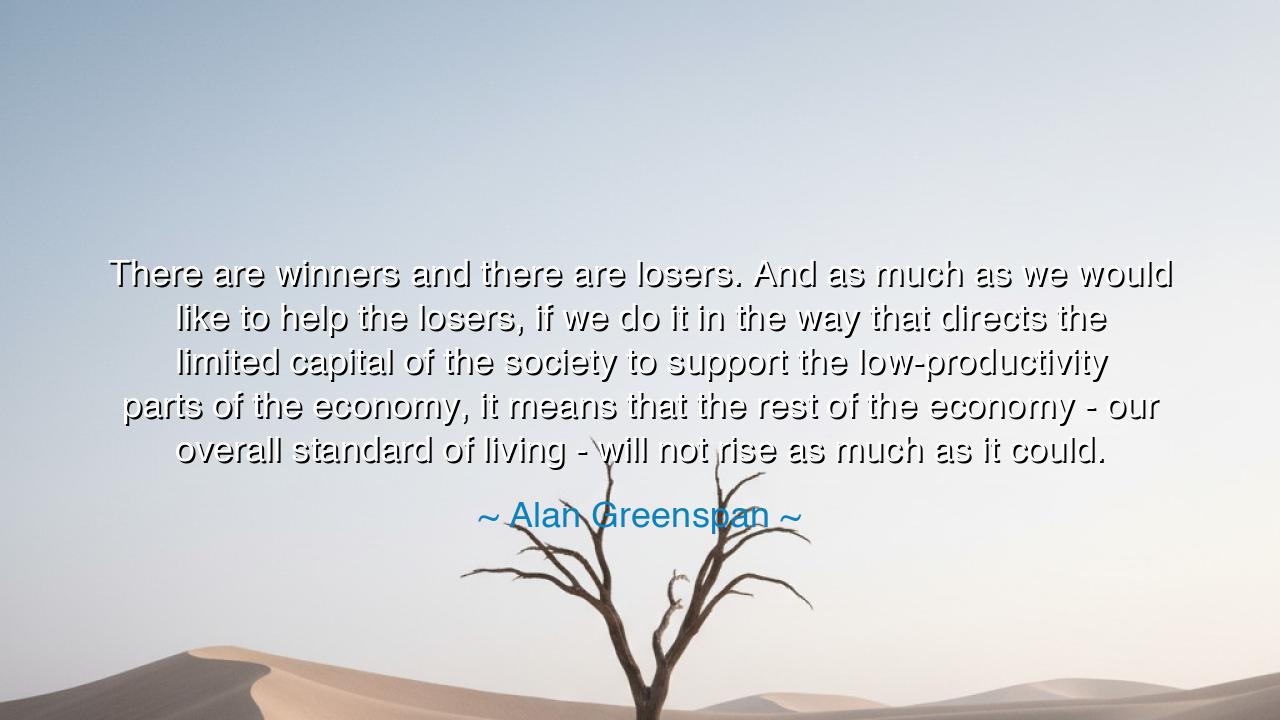
There are winners and there are losers. And as much as we would
There are winners and there are losers. And as much as we would like to help the losers, if we do it in the way that directs the limited capital of the society to support the low-productivity parts of the economy, it means that the rest of the economy - our overall standard of living - will not rise as much as it could.






Hear the words of Alan Greenspan, a man who presided over the tempests of markets and the tides of wealth: “There are winners and there are losers. And as much as we would like to help the losers, if we do it in the way that directs the limited capital of the society to support the low-productivity parts of the economy, it means that the rest of the economy—our overall standard of living—will not rise as much as it could.” These words are not soft with comfort but stern with realism, as if spoken by a physician diagnosing the sickness of nations. They remind us that resources are not infinite, and that the way we choose to use them shapes the fate of generations.
At the heart of Greenspan’s warning lies the truth that capital is scarce. Just as a farmer with only a handful of seeds must decide carefully where to plant, so too must a society choose how to invest its wealth. To place those seeds in barren soil is to ensure little growth, while to plant them in fertile ground is to reap abundance. In economic terms, to use resources propping up failing, low-productivity systems may soothe the immediate pain, but it comes at the cost of long-term prosperity. The balance between compassion and growth, between aiding the losers and empowering the winners, is one of the oldest dilemmas of governance.
The ancients knew this tension. In Rome, vast sums were spent to feed the masses with “bread and circuses.” For a time, this calmed unrest, but the constant redirection of resources toward spectacle and subsidy weakened the empire’s vigor. Military strength waned, innovation stalled, and corruption flourished. Rome did not collapse from poverty but from misused capital, squandered on appeasement rather than growth. Greenspan’s words echo this lesson: if a society devotes itself only to soothing wounds while neglecting to build strength, decline is inevitable.
And yet, history also shows the danger of neglect. In the Great Depression of the 1930s, millions of losers were left without aid as economies clung to rigid doctrines. Hunger spread, despair grew, and unrest threatened to tear nations apart. It was only when leaders like Roosevelt balanced compassion with productivity—through the New Deal, which provided both relief and investment in infrastructure—that recovery became possible. Thus we see: helping the weak is necessary, but it must be done in a way that also strengthens the whole.
Greenspan’s words, then, are not a denial of aid, but a reminder of wisdom in its giving. To support the losers is noble, but to do so by endlessly pouring treasure into unproductive systems is folly. True compassion uplifts without crippling, heals without binding, empowers rather than entraps. To direct capital into education, innovation, and opportunity is to help the vulnerable not by sustaining their weakness but by giving them the tools to rise. In this way, both the losers and the winners share in the prosperity of a rising standard of living.
The lesson is clear: charity without foresight is waste, but investment with justice is strength. Each of us must learn to balance the heart with the mind, mercy with prudence. In your own life, do not spend your time and treasure only to soothe the momentary, but also to build what endures. Lift the fallen, yes, but help them stand on their own feet. For the highest form of aid is not to create dependency, but to restore dignity through empowerment.
What, then, must we do? As individuals, we must be wise stewards of our own capital, be it money, time, or effort. As communities, we must demand that aid be paired with opportunity, that generosity be wed to accountability. As nations, we must plant our seeds in the fertile ground of innovation, education, and enterprise, while not forgetting to carry with us those who stumble. Only thus will our society grow strong, and our standard of living rise, not for a few, but for all.
Thus remember: there will always be winners and losers. But the destiny of a society lies not in denying this truth, but in guiding its capital wisely—so that the strong grow stronger, the weak are uplifted, and together, the people ascend toward a future of enduring prosperity.






AAdministratorAdministrator
Welcome, honored guests. Please leave a comment, we will respond soon